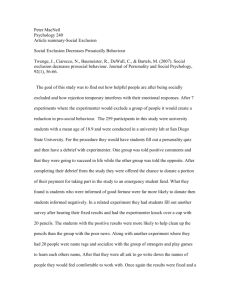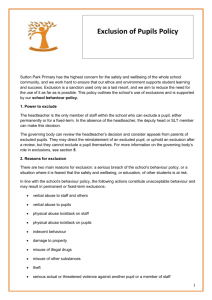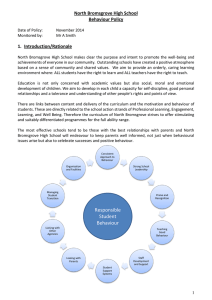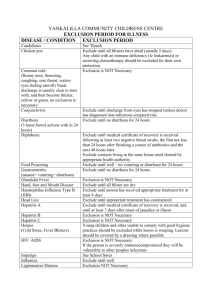Susan Bell Parent council 18 Feb
advertisement
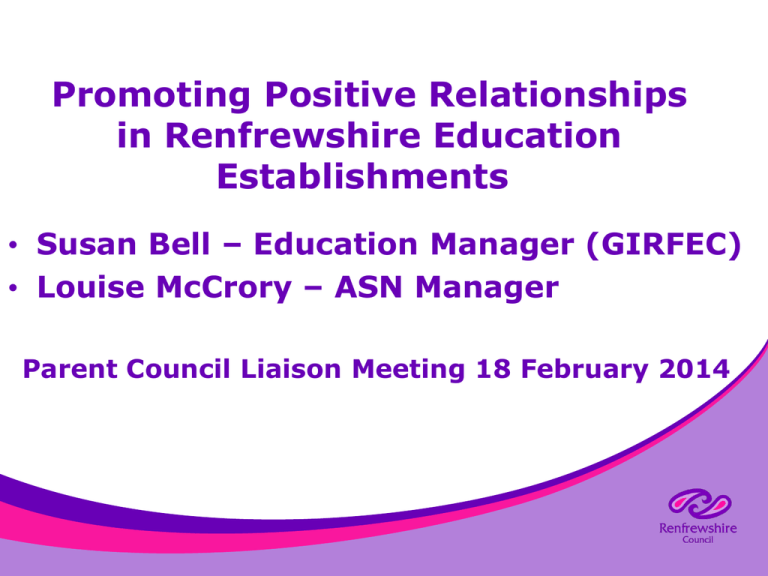
Promoting Positive Relationships in Renfrewshire Education Establishments • Susan Bell – Education Manager (GIRFEC) • Louise McCrory – ASN Manager Parent Council Liaison Meeting 18 February 2014 • Promoting Positive Relationships Policy • Included, Engaged and Involved (Part 2) – Standard Circular 8 on school exclusion • Parent Conferences Duty of education authority in providing school education (1) Where school education is provided to a child or young person by, or by virtue of arrangements made, or entered into, by, an education authority it shall be the duty of the authority to secure that the education is directed to the development of the personality, talents and mental and physical abilities of the child or young person to their fullest potential. Better Behaviour, Better Learning Discipline Task Group BBBL (2001) 36 Recommendations Connect Report – good practice • Government funding for implementation of BBBL and supporting pilot projects • Discipline Stakeholder Group (2004) • • • • Behaviour in Scottish Schools Research 2009 2009 • Cycle of policy into practice informing new policy • Intelligence gathering • National networks • ADES • LA meetings • 2009 BiSSR • Policy Guidance: Building Curriculum for Excellence through Positive Relationships and Behaviour 2010 • Language,tone,focus on implementation • Discipline Stakeholder Group re-named Scottish Advisory Group on Behaviour in Schools (SAGBiS) Policy Context – Response to Research “Curriculum for Excellence cannot be delivered without good relationships and positive behaviour” “Health and wellbeing across learning is a responsibility for all” “Underpinning this is the emotional health and wellbeing of staff.” Building Curriculum for Excellence Through Positive Relationships and Behaviour (2010) CfE / Pre-birth to 3 Food & Health MESP Wider Achievement Curricular Areas IDL Ethos 7 @rswhome Behaviour in Scottish Schools Research 2012 2012 Findings: • 4,898 surveys completed • Quantitative, qualitative, case study • Low-level disruption (e.g. talking out of turn; running in corridors; mobile phone use (sec)) • Serious disruption: not common • Positive trend Challenges: • Perceptions of support staff less positive • Peer-peer aggression • Increasing numbers of complex difficulties and specific disorders • Use of mobile devices Better Relationships Better Learning Better Behaviour (http://bit.ly/BRBLBB) • “Research demonstrates that investing time and resources into improving relationships and behaviour in establishments leads to positive outcomes around inclusion, engagement and achievement in the short term, and community safety and cohesion in the longer term.” Developing Children: Maslow (adapted) LOVE & SELF ACTUALISATION BELONGING SELF ? SOCIAL & EMOTIONAL ESTEEM COMPETENCE SOCIAL &SELF EMOTIONAL COMPETENCE ESTEEM LOVE & SELF ACTUALISATION BELONGING SAFETY & SECURITY PHYSIOLOGY: food, water, shelter, clothing ? Renfrewshire Policy •Promoting Positive Relationships – previously Improving Relationships and Promoting Positive Behaviour •Policy current being reviewed – all sector representation •Gathering of good practice from all sectors •Draft Education Policy Board – May •Consultation following Board - Schools - Parents - Pupils Policy areas • • • • • • • Background Purpose Ethos, relationships and leadership Understanding behaviour Positive approaches Staged intervention Settings and provision Included, engaged and involved part 2 Revised SC8 Exclusion of pupils from school Exclusion Guidelines • National guidance on Exclusion…Included, Engaged and Involved Part 2 steering group and draft policy 2010 • Consultation 2010-2011 and final publication • Focus on prevention Key principles • Promotion of inclusion • Exclusion on its own does not address the underlying reasons for exclusion Legal basis for exclusion Regulation 4 of the Schools General (Scotland) Regulations 1975, as amended An education authority (or a school, if operating under devolved responsibility) shall not exclude a learner from school unless the authority (or school) • Are of the opinion that the parent of the pupil refuses or fails to comply, or to allow the pupil to comply, with the rules, regulations or disciplinary requirements of the school • Consider that in all the circumstances to allow the pupil to continue attendance at the school would be likely to be seriously detrimental to order and discipline in the school or the educational well-being of the pupils there Key changes • In Renfrewshire the power to exclude is devolved to heads of establishment to a maximum of 4 days • Where incidents occur involving Looked After Children or children in primary 1 that may merit consideration of exclusion from school it is expected that the school will engage with the Children’s Services Support team, prior to any decision, to discuss an appropriate course of action and review support plans • It is expected that children and young people will not be excluded from alternative provision, however where this requires to be considered, any decision must be made in conjunction with the Children’s Services Support Team Decision to exclude Factors determining decision to exclude: • Is the level of indiscipline such that effective education in the mainstream setting is impossible at this time? • Does serious action require to be taken to prevent the level of disruption to the education of other learners? • Is the behaviour of the child or young person a danger to other children and young people and/or staff? • Is the parent/carer unwilling to co-operate with the school? Decision to exclude – the process The head teacher must have taken account of: • The particular situation giving rise to exclusion • The individual’s circumstances and needs; and • Any risk factors, particularly where the learner is a looked after child or vulnerable in another way Parent Conferences • Informal opportunities to engage with parents on a range of topics of interest • Half day (Saturday) with activities for children • Suggested topics – CfE; tackling bullying; promoting positive relationships; health and well-being; homework • Questionnaire for parents to follow




![Using the Pupil Premium to reduce inequalities in school exclusion [PPTX 185.17KB]](http://s2.studylib.net/store/data/014995431_1-56d2fe557efd3ce5c30d4ca5316f511f-300x300.png)
